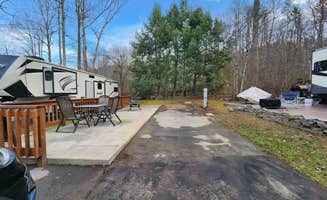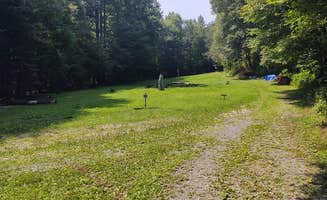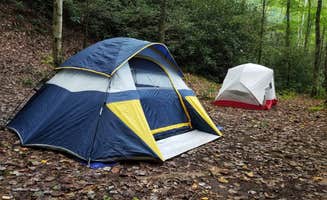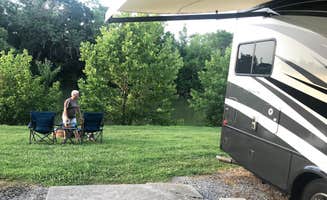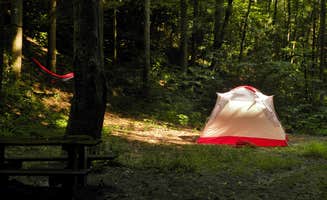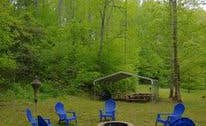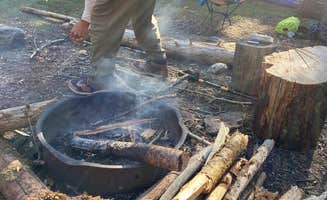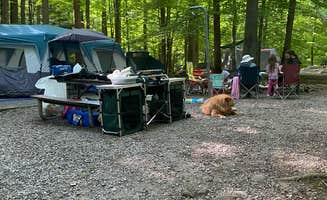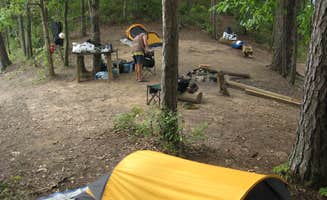Tent camping around Gatlinburg, Tennessee offers varied options at elevations ranging from 1,700 to 6,000+ feet, creating significant temperature differences between campsites. Most Great Smoky Mountains National Park camping areas operate seasonally from mid-April through October, with higher elevation sites experiencing temperatures 10-15 degrees cooler than those near Gatlinburg. Stream access varies significantly by location, with many backcountry sites positioned along creeks for water collection and filtering.
What to do
Hike to multiple 6,000+ foot peaks: The area near Tricorner Knob Shelter provides access to seven peaks over 6,000 feet, making it popular for the southern 6ers challenge. According to one visitor, "The area around the shelter is high, rocky, and remote. Expect 10-15 degrees less than the Park headquarters."
Enjoy creek swimming holes: Big Creek area offers natural swimming spots within walking distance of campsites. One camper reported, "The falls were beautiful, and jumping into Midnight Hole was fun. Even at midnight." These swimming areas provide relief during hot summer months.
Explore remote trails: Laurel Gap Shelter serves as an excellent base for wildflower viewing in spring. A visitor noted, "We descended into a lush landscape, replete with a vibrant display of spring wildflowers that turned the hike into a botanical wilderness." Many trails connecting to this area receive less foot traffic than the main Gatlinburg corridors.
What campers like
Privacy and quiet: The less-visited Cosby Campground receives fewer visitors than other Gatlinburg-area campgrounds. One camper shared, "Cosby tends to be a little quieter than Cades Cove or Elkmont, but I like it that way!" Another noted they "arrived close to dark and had our pick of gorgeous, wooded sites - even on a weekend in July."
Convenient trailheads: Many campgrounds feature direct trail access without driving. As one Cosby visitor explained, "Trailheads conveniently located inside the campground. Peaceful trails." This allows tent campers to park once and explore multiple trails throughout their stay.
Reliable site availability: Unlike other Smokies campgrounds that fill months ahead, some areas typically have openings. A camper mentioned that Cosby Campground "rarely fills up, allowing for the opportunity to pick your site when you get there." Local friends confirmed "this campground is never full" even during peak season.
What you should know
Bear safety requirements: Bear activity varies by location and season. At Cosby Knob Shelter, "cables for hanging all food" are provided to deter bears. All backcountry sites require proper food storage strategies.
Bathroom limitations: Composting toilets at shelters require regular maintenance. One camper at Tricorner Knob noted the facility "was brimming with waste due to the site's popularity and suffered from inadequate maintenance." During summer, these facilities attract insects.
Permit systems: Backcountry camping requires advance permits through the Great Smoky Mountains National Park reservation system. A Mount LeConte visitor clarified, "You have to get a permit through the GSMNP website" rather than showing up without reservations.
Seasonal closures: Many campgrounds close completely during winter. Big Creek Campground operates seasonally with the rest of the frontcountry campgrounds, while some backcountry shelters remain open year-round with reduced services.
Tips for camping with families
Choose accessible water sites: Bote Mountain Campsite 18 offers easier access for families with children. A camper noted, "Short hike from your vehicle on Laurel Gap Rd. West Prong of the Little River runs right through both separated sites, so plenty of water is an understatement." This allows quick access to cooling off in hot weather.
Consider weight carrying requirements: Many tent camping options require carrying gear various distances. At Big Creek Campground, "You cannot park your car right on the campsite. There is a parking lot and you need to carry your gear in. It's about 100 feet to the sites." Plan accordingly with appropriate gear quantities.
Check for nearby groceries: Last-minute supplies can be found in surrounding communities. One camper recommended, "IGA grocery store in Townsend is only 20 minutes away, makes for a great place to pick up last minute food ideas before hiking in to your site."
Verify pet policies: Rules vary significantly between frontcountry and backcountry sites. At Cosby Campground, "dogs are welcome in the campground but not on the majority of the trails." Most backcountry shelters prohibit pets entirely.
Tips from RVers
Limited RV camping options: Most Great Smoky Mountains National Park campsites have restrictions on RV length and amenities. Riverside RV Park & Resort outside the park offers "many RV sites and cabins along the bend of the Little Pidgeon River" with full hookups not available inside park boundaries.
Consider alternative entry points: Traffic congestion around Gatlinburg can complicate RV travel. One visitor noted Riverside RV Park is "easy to get from Knoxville without going into the craziest part of traffic in Sevierville" making it more accessible for larger vehicles.
Expect minimal amenities: Even RV-friendly park campgrounds lack full services. Cosby Campground is described as "a typical big National Park campground but with slightly simpler amenities" - providing basic services without the full hookups found at private campgrounds.


